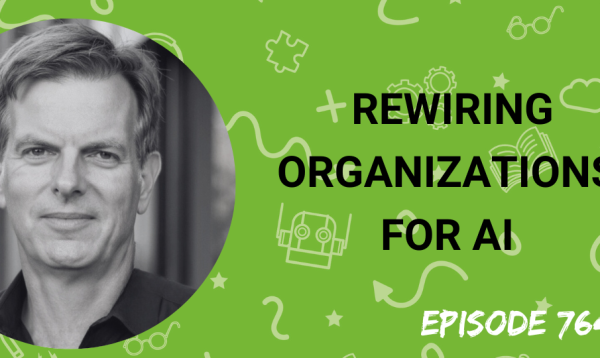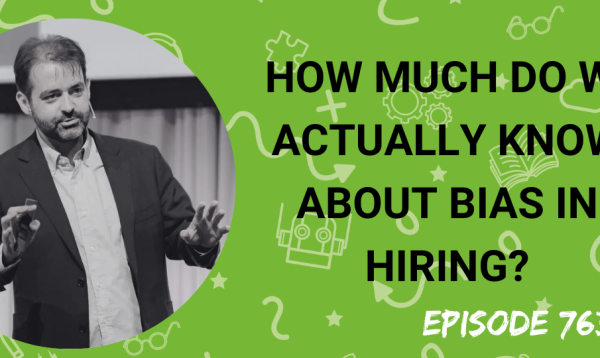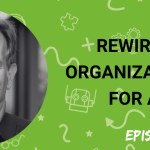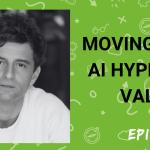The early careers landscape is experiencing unprecedented disruption. While AI technology offers opportunities to transform how organizations operate, it eliminates many administrative tasks that once formed the foundation of entry-level positions. At the same time, employers are rigidly demanding years of experience and specific technical skills for roles labeled as “entry-level,” leaving Gen Z unable to even begin their careers and risking their disconnection from the workforce altogether.
So, how can talent acquisition professionals transform this crisis into an opportunity?
My guest this week is Caitlin McGregor, CEO and co-founder of Plum. Caitlin shows how employers can leverage Gen Z as the first AI-native workforce who don’t have to unlearn old ways of working – they can start with AI-powered approaches from day one without the burden of “how things used to be done.” But accessing this advantage requires shifting focus toward durable skills like innovation, adaptation, and communication, not the hard, perishable skills most employers are currently looking for
In the interview, we discuss:
• How AI is disrupting the foundation of early careers
• The issues with employers demanding three years of experience for entry-level roles
• The outdated lens we’re using to evaluate Gen Z talent
•
• Why Gen Z can approach work from an AI-first perspective without legacy thinking
• How durable skills like innovation and adaptation predict long-term performance
•
• The importance of assessment tools that provide value to the candidate
• The success Scotiabank has had by eliminating the use of resumes in campus hiring
• What does the future look like?
Follow this podcast on Apple Podcasts.
Follow this podcast on Spotify
00:00
Matt Alder
AI is rapidly eliminating the administrative tasks that once formed the foundation of entry level jobs. Simultaneously, many employers are now demanding as much as three years relevant work experience for roles that are labelled as entry level. Gen Z represents 18% of our workforce and that’s going to grow to 30% by 2030. This early careers crisis threatens to create a massive future talent shortage. If Gen Z can’t get started in their careers, where will our future workforce come from and who will lead our organizations? Support for this podcast comes from Plum. Plum is a revolutionary workforce solutions provider that knows when people flourish, business thrives. With their powerful platform, Plum Thrive, you can unlock science based data to help you measure and match human potential to job needs.
01:01
Matt Alder
Plum Thrive provides personalized career insights, improves quality of hire and creates high performing teams from a single simple to use platform. Want to learn more? Visit www.plum.IO and discover all the ways that Plum can help you thrive. Hi there, this is Matt Alder. Welcome to episode 701 of Recruiting Future, the podcast that helps talent acquisition teams drive measurable value by developing strategic capability in foresight, influence talent and technology. In this episode we’ll be focusing specifically on talent. The early careers landscape is experiencing unprecedented disruption while AI offers opportunities to transform how organizations operate and it eliminates many administrative tasks that once formed the foundation of entry level positions.
02:24
Matt Alder
At the same time, employers are rigidly demanding years of experience and specific technical skills for roles labeled as entry level, leaving Gen Z unable to even begin their careers and risking their disconnection from the workforce altogether. So how can tele acquisition professionals transform this crisis into an opportunity? My guest this week is Caitlin McGregor, CEO and co founder of Plum. Caitlin shows us how employers can leverage Gen Z as the first AI native workforce who don’t have to unlearn the old ways of working. They can start with AI powered approaches from day one without the burden of how things used to be done. But accessing this advantage requires shifting focus towards durable skills like innovation, adaptation and communication, not the hard perishable skills that most employers are currently looking for. Hi Caitlin and welcome back to the podcast.
03:25
Caitlin MacGregor
Hi, I’m excited to be here again. Thanks for having me.
03:28
Matt Alder
Always a pleasure to talk to you. Could you just quickly introduce yourself and tell everyone what you do if they’ve not listened to you on the podcast before?
03:36
Caitlin MacGregor
So, My name’s Caitlin MacGregor. I’m the CEO and co founder of Plum and we are the leading soft skills assessment for high volume early career hires and employee development.
03:48
Matt Alder
Now, in pretty much every podcast, I’ve recorded in the last 12 months. I’ve started with asking a question about disruption and what’s going on. And we focus a lot on AI and other disruptions in talent acquisition, but perhaps don’t talk broadly enough about how it’s disrupting other areas of business, but in particular how it’s disrupting the way that we think about things like careers. I mean, give us your perspective. How is it disrupting work? How is it sort of changing that, potentially changing that concept of the linear career that we’re all so used to.
04:24
Caitlin MacGregor
I mean, I think for a while we’ve been talking about how the traditional career ladder is being disrupted and it’s more of about a career lattice. So you know, becoming a BDR doesn’t make you the best sales rep, doesn’t make you the best sales leader. You know, people are going to change careers much more often now. But what’s missed in the conversation is really thinking about how careers start the on ramp into careers, that there is a fundamental disruption that’s happening in the gen Z population. 18 to 28 year olds. How are they getting the first three years of their work experience? Because most entry level jobs, over 60% of entry level jobs require three years of prior work experience. So how are they getting that experience?
05:12
Caitlin MacGregor
And traditionally those early career entry level jobs have a lot of administrative tasks to them, a lot of repetition and guess what? AI is disrupting the repetitive administrative type tasks. So we’re having this time where AI is coming for a lot of those entry level jobs. So how are people going to be onboarded into their careers and get those first years of experience? And I don’t think we’re taught realizing the impact that AI is having first and foremost on early careers.
05:45
Matt Alder
Yeah, it’s really interesting because I think in been talking about AI on the podcast actually since about 2018 when things were, you know, machine learning and AI and things like that and all that time, and especially the last sort of two years, not many people have talked about that disruption to early careers. And I think that kind of obsession with experience is just still there. I mean, I was reading an article earlier in the week about internships and how there’s like drop internships but they were still very much a thing. But actually employers were looking for interns who’d already been interns or who had previous experience in their industry. So it’s just kind of an obsession and as you say, it’s just not going to work moving forward, is it?
06:26
Caitlin MacGregor
Yeah, I mean, it also makes us reevaluate. You know, what are we even asking for Gen Zs that make up, you know, almost 20% of the workforce? It’s 18% of the workforce, and they’re projected to grow 30% by 2030. So we’re talking about a massive part of the population. And when we’re asking for them to meet certain job requirements, are we thinking about it through the right lens? I mean, if we go back and think about baby boomers, when they were entering the workforce, when their careers developed, there was a time where all of a sudden job requirements were, do you know how to use a desktop computer? Do you know how to use Microsoft Word? Do you know how to use Excel? Because there was a difference between people that were computer literate and people that weren’t.
07:17
Caitlin MacGregor
And all of a sudden people that were doing things manually doesn’t matter if they were doing it for 10, 20 years. All of a sudden it didn’t matter if you knew how to do accounting manually. It was, do you now know how to use a computer and Excel? And that was the most valuable skillset. When we’re looking at early careers and we’re looking at Gen Zs, are we still applying an old lens to how we should be evaluating that talent? Do I really want somebody that’s been doing marketing for the last 10 years not using gen AI? Do I really want a product manager who’s doing discovery calls without using transcripts and analyzing those transcripts and using templates and using Genai to fill those templates? Like, we have an opportunity to look at this new generation as a clean slate.
08:07
Caitlin MacGregor
They have an opportunity to do things from an AI first perspective and not have to train them out of old ways of doing things. They can invent from day one how to be more efficient and how to use this technology. And so instead of seeing it as a disadvantage that they don’t have three, five years of experience, we can see them as native Gen AI users and an opportunity to be more efficient. Which means, okay, if the old way of measuring them doesn’t work, it opens the question to, okay, if they are this new opportunity for employers and to benefit early careers in a new way, how should we be evaluating them?
08:46
Matt Alder
It’s such a great point because they are the closest thing we currently have to a kind of an AI native generation, or at least a generation that can start in their careers unburdened by how things were done before and all that and all that kind of stuff. So, I mean, it’s a huge opportunity for everyone. So how do we kind of unlock those talents? How do companies sort of, you know, look at, you know, rather than looking for interns who’ve already been interns or already worked in their industry or have contacts in their industry, how can they kind of view people coming into the workforce and make sure they’re getting the right people for their organization?
09:23
Caitlin MacGregor
Well, the great news is there’s another trend that everybody’s been talking about. I just think we have an opportunity to evolve how we about that trend and think about it slightly differently. But already there’s momentum in this direction that we can kind of harness, which is the idea of becoming a skills based organization. I think in principle, companies, governments, organizations that say they want to become skills based, they’re trying to get away from that past experience, you know, where somebody went to school where they previously worked.
09:51
Caitlin MacGregor
But when we look at how it’s being applied in practice, it’s still coming back down to scraping a whole bunch of keywords and looking still at, okay, I don’t care if they did a computer science degree for four years at this name brand school, but I still want them to have Python experience, I still want them to have Java experience. It still comes down to the keywords. And we’re looking still at where’s that proof point that they’ve used Salesforce before? Where’s that proof point that they’ve, you know, worked at this type of company from my industry before. We’re still using skills base to kind of wash the, but still use old methods of measurement just under a new name.
10:32
Caitlin MacGregor
And so I think the opportunity is to actually lean into what skills base should represent, which is when you look at the data of what predicts performance, long term performance and when you look at what predicts long term retention, not those hard skills that really should be called perishable skills. Because within two and a half years, 50% of hard skills, you know, technical hard skills are no longer relevant. I like to use the example of that six years ago everybody wanted to hire a Ruby on Rails developer. Now it’s a joke. Nobody wants to hire a Ruby on Rails developer because unless you’re trying to keep an old piece of technology alive, nobody’s coding in that language anymore. So there’s this need to move away from the perishable skills and instead focus on the durable skills, which are those soft transferable skills.
11:20
Caitlin MacGregor
And I really credit the education sector and for really embracing the term durable skills. Looking at those soft transferable skills that are so critical because they’re going to endure throughout somebody’s career. They’re going to be the most predictive and most important for success long term. And industrial organizational psychologists have decades of research showing that those durable skills, innovation, communication, execution, actually are the things that predict performance and retention. And when you think about AI, you need somebody that is going to be thinking how to do these jobs differently than before, how to find new out of the box ways of doing things. That’s innovation. You’re going to need somebody that is very comfortable of iterating and figuring things out and doing things differently as time evolves. That’s adaptation. You’re going to need somebody that’s really good at communicating to others.
12:15
Caitlin MacGregor
Hey, I took this different approach and I came up with these different outcomes and this is how we can all benefit from it. That’s communication. It’s somebody that’s going to be rolling up their sleeves and experimenting until they find a better, more efficient way forward. And it’s not based on past, it’s based on figuring it out in the moment and that ability to be agile in the moment. And those are all durable skills. So the answer is measure those first. Find the people that align to the behaviors that you are looking for in your roles. You want somebody to be talking to customers, great. Find somebody who really enjoys managing stakeholders and enjoys working with other people. It’s just all about those durable skills.
13:01
Matt Alder
Talk us through the role assessment can now play in measuring those.
13:07
Caitlin MacGregor
I think everybody’s come across a psychometric assessment one time in their career. It may be Myers Briggs, which just makes me cringe because, you know, it’s not backed by science. And so there’s a lot of reeducating to be done. But if you’ve had a really good assessment, there’s this mirror effect where you’re like, wow, that’s me. That really expresses me. The problem in the industry up until now is that those assessments have had a horrible candidate experience. They’ve been too long, they have provided no value to the candidate. They’ve been kind of this black box. If you do it for the employer, you have to do different ones for different jobs, different employers. There’s no benefit to the person.
13:48
Caitlin MacGregor
So they got a really bad rap between a bunch of things like Myers Briggs that didn’t have the science behind it and others that had the science but just had horrible experiences associated with them. And then the third part was cost. They used to charge per assessment. And so it was really costly to think about doing this top of funnel on everybody. So now in 2025, believe it or not, you can find assessments that actually are assessments that candidates want to take. At Plum, we have a 93% completion rate and 94% of candidates say that they find value in their Plum profile. They actually thank employers for the opportunity to be seen, not for what they’ve done historically, but based on what they could do if given the opportunity. So you can have a really positive experience.
14:34
Caitlin MacGregor
Experience going through a modern assessment that’s really credible ensures that there’s no adverse impact, there’s no bias, it ensures that it’s fair and it’s using all the best practices, but an experience that individuals love taking and benefit from. And you can provide that for every single person as they apply. So as you’re getting overwhelmed with more and more people applying online, so it is possible now in 2025 to have a really positive experience and measure durable skills as part of that initial screen of candidates.
15:09
Matt Alder
And I think that candidate experience thing is just so important because I think what tools like yours do is they just give people that kind of instant feedback that we all kind of crave whenever we go through some kind of process like this, that people are sort of taking away insights and things that they can work with. You know, whatever the outcome of the.
15:28
Caitlin MacGregor
Interview is, it’s amazing. Especially if you think of early career. I mean, I’m very lucky. I studied international development and I was going down a career path around the not for profit space. And it just so happened that I discovered very early that I was an entrepreneur. But if I look at my Plum profile, a lot of the information was there to tell me that I would be much better suited being an entrepreneur, much better suited in business, much better suited innovative, fast paced environments.
15:59
Matt Alder
And can you give us an example of this working in practice in early careers?
16:03
Caitlin MacGregor
Yeah, absolutely. I mean, we love working with Scotiabank, who was really bold, they were ahead of the curve and they eliminated resumes for all their campus hires. So they used to only hire from five universities and colleges. And so what would happen is they’d be competing for the same pool of talent from all their banks and consulting firms. And so they were really bold, eliminated resumes and had people apply with their Plum profile. And what that’s able to do is that it matches them to 14 different jobs at the bank. So somebody might apply to be a financial analyst, but actually be a much better fit as an account manager. And it’ll match them based on their durable skills and help them select who to bring in for that structured interview.
16:45
Caitlin MacGregor
And the results are that they’re now hiring from 33 different colleges and universities. They’ve increased their hiring of underrepresented minorities to 60% and they doubled retention by screening in all these people that they wouldn’t have been looking at before.
16:59
Matt Alder
And as a final question for you, what do you hope the future looks like? What’s your kind of your vision for the future around this, particularly for Gen Z. But also it’s only a couple of years before Generation Alpha starts hitting the workforce as well. And then we are talking about an AI native kind of cohort. So what do you think the future is going to look like?
17:20
Caitlin MacGregor
I mean, my kids are Generation Alpha and I know that the world is changing so quickly that what I want for them is I don’t care if they’re going to become doctors, lawyers, teachers, nurses. I want them to find careers that are going to make them happy, fulfilled and thrive. They need to be self aware about their durable skills and where those best fit and they need employers that are going to value those durable skills. So I hope that we’re talking less by the time they hit the workforce around do you know this hard skill or that hard skill and more around we’re looking for these type of behaviors. Is that the thing that’s your superpower? Is that the thing that gets you out of bed in the morning, excited about the work you’re going to do?
18:00
Caitlin MacGregor
Or is that the thing that frankly is not the best use of your time and resources and is really draining? And so I’d love to see the world switch where we’re really prioritizing, where we’re going to get the most productivity out of people and in exchange they’re getting the most fulfillment from their work.
18:15
Matt Alder
Caitlin, thank you very much for talking to me.
18:17
Caitlin MacGregor
Thank you for having me.
18:20
Matt Alder
My thanks to Caitlin. You can follow this podcast on Apple Podcasts, on Spotify or wherever you get your podcasts. You can search all the past episodes at recruitingfuture.com on that site. You can also sign up for our weekly newsletter, Recruiting Future Feast, and get the inside track on everything that’s coming up on the show. Thanks very much for listening. I’ll be back next time and I hope you’ll join me.








